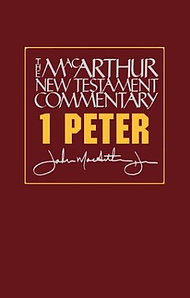 I found myself referring to this commentary enough during our Community Group's study of I Peter that I decided to go ahead and read the whole thing so I could get credit for it.
I found myself referring to this commentary enough during our Community Group's study of I Peter that I decided to go ahead and read the whole thing so I could get credit for it.
This commentary strikes a balance between being devotional, exegetical, and expository. If you are looking to go deep into the greek grammar or syntax, this is not the techinical commentary you want. That said, MacArthur provides enough information on the original language to understand the key points and clear flow of Peter's letter. MacArthur also digs deep enough to satisfactorily explain tough passages such as I Peter 3:18-22.
At times it feels like MacArthur launches into lengthy rabbit trails that only seem to be peripherally related to the passage in I Peter that he is commenting on. These rabbit trails are of course interesting and edifying but at times were distracting from the study of the actual passage.
Overall, a great tool for studying and heeding a great book of the Bible.

